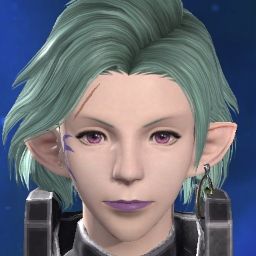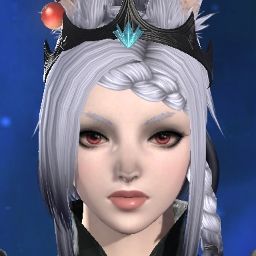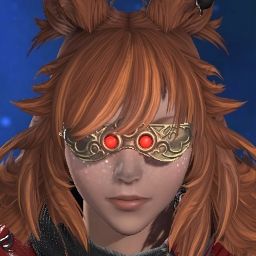The Thirteenth is already aether-starved, it's a big thing with the voidsent. So presumably the Thirteenth would be a pretty empty meal.
Also, the Ascians wanted everything back exactly how it was, which requires also fixing and rejoining the Thirteenth. It's not expendable to them.
And on the other subject: the soul crystals contained the unsundered's memories of the entire Convocation, which were used to awaken the sundered's full Ancient memories when they found them after a death. It was clearly not the only method, but Mitron's technique looked... pretty bad, so the crystals were reasonably the standard technique. We dumped them into the Crystal Tower with Elidibus, so they were effectively disposed of. The exception is Azem's crystal, which actually contained no memories, but rather a spell of Azem's making.
This hasn't been 'retconned' or anything, that is very directly how it worked, how it was stated in 5.3 and how it is treated in Endwalker.
-
01-28-2022 05:04 PM #1021Player

- Join Date
- Sep 2021
- Location
- Solution Eight (it's not as good)
- Posts
- 3,031
- Character
- Ein Dose
- World
- Mateus
- Main Class
- Alchemist Lv 100
(5)Last edited by Cleretic; 01-28-2022 at 05:10 PM.
-
01-28-2022 05:55 PM #1022
-
01-28-2022 06:05 PM
Player
-
01-28-2022 10:32 PM #1023
It was clear in 5.3, yes, it was made less clear in EW. There was even a thread about it not that long ago.
The cutscene after the Mothercrystal trial particularly sticks out, though I want to say that wasn't the only time in EW it was implied the Azem crystal pre-dated the sundering. I'm curious what other languages say in that scene, because English seemed to muddy the waters.(4)
-
01-28-2022 11:15 PM #1024Player

- Join Date
- Jul 2015
- Location
- Meracydia
- Posts
- 3,883
- Character
- Lythia Norvaine
- World
- Gilgamesh
- Main Class
- Viper Lv 100
The inscription on the Azem crystal was definitely written after the sundering. There are time travel shenanigans afoot involving uninscribed soul crystals, though, so keep an eye on this raid series.
And now we switch over to a new debate. And again, I don't mind, but it's just strange that you keep dropping bait for new arguments and then throw claims of 'hostility' when you're finally granted the battle for which your soul so yearns. At least Zenos didn't try to guilt trip me after fighting him. But go on, you have my last quoted evidence from Amon regarding his memories of Elpis and Meteion. Feel free to have a go at that if you like.(0)
-
01-28-2022 11:44 PM #1025Player

- Join Date
- Jul 2015
- Location
- Amaurot
- Posts
- 4,449
- Character
- Tristain Archambeau
- World
- Cerberus
- Main Class
- Black Mage Lv 90
Thanks for providing this. I somehow managed to miss it. This does indeed seem a little more specific than the EN version:
Compared to:Thus did a further half of the remaining people offer up their lives to Zodiark, that he might cleanse the planet and seed new life on it.
You could argue the implication is there in the EN version since the point of such sacrifices is to power him, but given how the ancients used creations to "seed new life" on the star, I get the sense that he'd be doing just that (as opposed to humping the planet or something similar...) We saw from the fight where Amon was controlling him that he could realise concepts. If I had to guess what the idea was here, it was to revive the planet, restore its natural processes, seed creations on it which, meeting the right criteria, would qualify for appropriate souls from the star, and then when natural reproductive processes had help further expand and augment the quantity of that, offer up those beings to him in order to exchange it for the souls inside him. His astral aspect may even have served to stimulate the whole process. Granted, there's still some vagueness in it, but we won't get a much clearer account than this unless they choose to clarify it further...Once more did our people give of themselves to Zodiark. Another half of our race sacrificed to cleanse the world; to ensure that trees and grasses and myriad tiny lives would sprout and grow and flourish.(8)Last edited by Lauront; 01-29-2022 at 10:39 PM.
When the game's story becomes self-aware:

-
01-28-2022 11:49 PM #1026
-
01-29-2022 12:04 AM #1027
No, you're remembering correctly.
I never saw this as a problem though. The fact that the convocation's memory crystals were created after the sundering doesn't necessarily mean that memory crystals weren't a thing before.
I merely took the Pandaemonium one as an earlier model. Though we don't know details yet, so it might still get explained further.(11)
-
01-29-2022 12:40 AM #1028Player

- Join Date
- Jul 2015
- Location
- Amaurot
- Posts
- 4,449
- Character
- Tristain Archambeau
- World
- Cerberus
- Main Class
- Black Mage Lv 90
That is certainly the interpretation the texts support, i.e. that Lahabrea, Elidibus and Emet-Selch created these with their memories of the Convocation members and that Emet-Selch secretly created an Azem one. I'd be hesitant to say it's been retconned, as opposed to being a damn good replica of the original; this explanation makes sense to me. The writing around it is slightly confusing, but I think the idea that Emet did his best job creating a replica of the original crystal is a reasonable assumption.
The way I see these crystals (the re-created ones) is that they act as memory stimulants, much like the starshowers do with the Echo. We have quite a bit of lore on memory aether thanks to Bozja and 5.2 (and smatterings in 5.1 and 5.4 but more to do with tempering):
Bozja:
From which it is evident that it occupies its own type of aether, presumably bundled with soul aether. Transferring it apparently is a different story (crystallised blood being used as a conduit for that) but I think it's clear enough from the above that it is associated with incorporeal aether given that a ghost can possess it.Mikoto: Perhaps I should start with a simple explanation, as I did before. Let us consider the composition of a person's aether, shall we? There is corporeal aether of the flesh, incorporeal aether of the soul, and the aetherial residue of an individual's memories.
Mikoto: Were one to be possessed of only corporeal aether, they would be but a walking corpse. Conversely, entities comprised of only incorporeal aether are referred to in layman's terms as ghosts. Of course, a ghost that possesses residual memories could likely recall its past and retain self-awareness.
Mikoto: Using a crystal focus, we can isolate the aetherial signature of memories, much in the same way the seers did. We can then delve into and explore specific memories conjured by the subject.
Mikoto: We must be careful of what we observe, however, for while the information stored in a person's memories can be quite comprehensive, it is not always true to fact. They can be distorted due to the passage of time, or even when first committed to the mind as a result of personal bias.
Mikoto: That is why it is important to mark the distinction between explicit and implicit memories.
Mikoto: Explicit memories are those consciously stored and recalled, while implicit memories are more passively accumulated by our subconscious.
Mikoto: When meeting someone for the first time, their appearance will be kept as part of our explicit memory, though this may fade with the passing of time. Should a great deal of time pass without meeting, however, such recollection can prove difficult.
Mikoto: Yet in that moment, your mind also takes record of everything experienced by your sensory nervous system.
Mikoto: Unfortunately, information called from explicit memory is quite sensitive to misrepresentations of events. After all, if an individual is actively choosing to recall an event, who is to say they will not make alterations to better suit their liking?
Mikoto: That is why we seek information from implicit memory, which is more likely to be preserved free of the bias of an individual's worldview.
5.2: Elidibus (Echoes of a Fallen Star)
We can presume a somewhat similar principle operates for the Convocation crystals (or the Ascian Prime method Mitron used in 5.4), provided that the memories exist to awaken.Nay, I think not─though the stars I acknowledge mine. A convenient illusion apt to awaken what little is left of the power that once resided in your sundered souls.
That which you and yours call the Echo.
And an echo it is. Of a symphony. But a fraction of what men, in their completeness, once possessed.
Even those among you who tower over others in the gift have only the faintest trace of it.
But though sundered and forgotten, through death and mocking rebirth, it has persisted. A whisper of our past, burned into your very aether─along with the sight of our end.
Through the rekindling of memory, I have awoken the ability─just as Hydaelyn is wont to do when She has need of new minions.(9)Last edited by Lauront; 01-29-2022 at 12:44 AM.
When the game's story becomes self-aware:

-
01-29-2022 01:13 AM #1029Player

- Join Date
- May 2015
- Location
- Valnain
- Posts
- 828
- Character
- Wind-up Antecedent
- World
- Zalera
- Main Class
- Rogue Lv 100
Reading through all that reminds me of a thing I'd been thinking about these past few days—which of the three attempted sacrifices Venat argued against in the infamous post-Elpis scene, as well as whether the scene was intended to be symbolic or literal. But specifically this part:
I had already been musing over the idea, but I think this actually gives it some merit: The scene where Venat walks through the ruins of Amaurot, chews out the survivors for not being able to cope with their loss, then righteously sunders the world? That might actually be what Venat/Hydaelyn remembers happening. Whether that's because of Elidibus-style memory degradation or a Cid-style refusal to accept the truth, Venat may simply remember things happening in a way they truly did not.Mikoto: We must be careful of what we observe, however, for while the information stored in a person's memories can be quite comprehensive, it is not always true to fact. They can be distorted due to the passage of time, or even when first committed to the mind as a result of personal bias.
Mikoto: That is why it is important to mark the distinction between explicit and implicit memories.
Mikoto: Explicit memories are those consciously stored and recalled, while implicit memories are more passively accumulated by our subconscious.
Mikoto: When meeting someone for the first time, their appearance will be kept as part of our explicit memory, though this may fade with the passing of time. Should a great deal of time pass without meeting, however, such recollection can prove difficult.
But if that were the case, I imagine the story would have built on it instead of leaving it as a loose end. And I doubt they'll ever revisit it, given how hard they pushed 6.0 as the end of the Hydaelyn/Zodiark arc.(11)
-
01-29-2022 01:23 AM #1030Player

- Join Date
- Feb 2021
- Posts
- 3,472
- Character
- Kizuya Katogami
- World
- Cerberus
- Main Class
- Conjurer Lv 81
Tbh, this is what i’ve been thinking too, partially because i’ve kind of tried to use it to remedy the absolute asspull that was the Elidibus memory degradation, so i’ve always figured how do we know the same didn’t happen to both of the hearts? How are we so sure that Venat’s recollection is truly accurate? The problem here is we have seen 2 biased sides, and not a neutral one. But seeing that it’s the end of the arc yeah, i don’t think we’ll ever know tbh, which is a bit tragic. For an expansion that was supposed to tie up all the loose ends there are many unanswered questions.
(7)





 Reply With Quote
Reply With Quote








